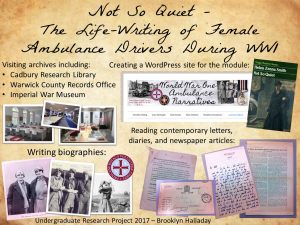My UG Research project was officially titled ‘Not So Quiet: The Life-Writing of Female Ambulance Drivers during WW1,’ but the scope of the project expanded significantly to WW1 life-writing in general when we found a plethora of materials at the Cadbury Research Library (CRL). The work of women during the war – separate to the Suffrage movement – was not something I’d previously looked into, so I greatly looked forward to discovering voices that seemed largely to have been forgotten.
I thought by undertaking a UGRS project, which included the opportunity to work in the CRL, I’d be able to live out my Hermione Granger dream. I was imagining shelves upon shelves of musty yellowed pages and cramped desks with flickering light bulbs. My hair getting frizzier and frizzier the more war letters I poured over. While I probably did pull some hair out for the amount of times I read Humphrey Humphreys complain to his mother that the desert heat had melted all his chocolate when I needed him to give more details about his ambulance work, I can confirm that the CRL, contrary to Hogwarts, promotes good lighting and the best hygiene practices.
Suffice to say, the research was not exactly what I was imagining, and that turned out to be a good thing. Reading the war letters was probably the most interesting and rewarding part of the project. I read about one man’s war life from Spring 1915 to early 1918, so I got to work with several letters on the exact day their words turned 100 years old.

My work also aided the preparation for the ‘Remembering World War One’ module running for final year English Literature students, and the UGRS just proved how many valuable resources there are right on campus that provide students with the opportunity to engage tangibly with the time period they might be studying.
In terms of how the project has changed my perception of academic research, while being less like Harry Potter than I initially thought, I’ve also come to realise that no amount of research is enough research. It’s difficult to know when to stop, or how to decide which avenues to follow when so many things you think are only just relevant could expand into what becomes the new focus of your work. It can also be hard to rationalise to yourself that all lines of research are worth pursuing even if several of them lead to a dead-end. At the end of every work day I’d struggle with the question ‘have I done enough?’ but it’s important to realise that research involves a lot trial and error, and even the mostly ‘error’ days are valuable.
Brooklyn Halladay, BA English and Creative Writing
